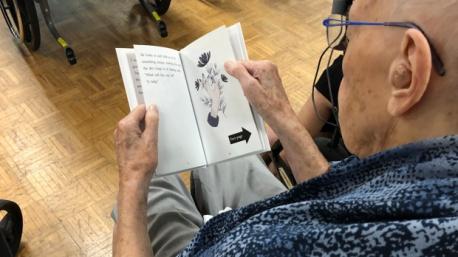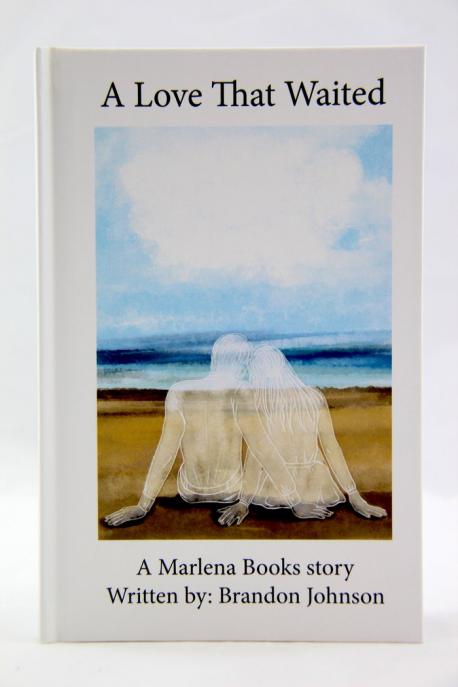Results: Picture Perfect Books Open Up New World Of Reading To Dementia Sufferers
Published on 09/23/2018
QUESTIONS
GO to COMMENTS
Comments
1.
1.
One day in 2015, Rachel Thompson's grandmother, who had long lived with dementia, picked up a newspaper and began reading its headlines aloud, shocking her family who thought that her condition had robbed her of a favourite pastime. It got Rachel, a health studies major in university, thinking. Maybe it wasn't that her grandmother couldn't read, it was just that she couldn't read the books she used to read any longer. So Rachel began researching the ties between the procedural memory and reading for individuals living with dementia, and in 2018 started her own company , Marlena Books -- the name a combination of "Marilyn" and "Helena," her two grandmothers' names -- which published "dementia-friendly" illustrated books on everything from romance to sports. This Canadian-owned and operated business has become a big success, born out of the love for her grandmother. Do you have a loved one with dementia who you think would enjoy these books?

Yes
11%
192 votes
Not really
12%
212 votes
Perhaps
12%
204 votes
No loved ones with dementia
65%
1114 votes
2.
2.
Rachel designed these books to provide people living with Alzheimer's disease and dementia more "meaningful recreation" than the children's books they are often given by caregivers. Here are a few of the carefully-researched features of her books. Which ones do you agree are valuable in books of this nature?

They focus on mature stories, so stuff that older adults would actually be interested in, but they're at a reading level that is adjusted to be easier for them to read
24%
419 votes
They're quite short, so they're always under 750 words so they can be read in one sitting.
27%
460 votes
Design-wise, they use hard covers and thicker paper weights for those with dexterity issues
20%
350 votes
For those with vision loss, font type, size and spacing have been designed following the Canadian National Institute for the Blind's "clear print" guidelines. Based on dementia eye-tracking studies, margins are also smaller than in typical books. "Turn page" prompts, moreover, are found at the bottom of each page.
22%
382 votes
You only see text on half of the page that has text because individuals with dementia will often get overwhelmed if they're facing a full page of text
19%
332 votes
The stories are also intentionally meant to evoke earlier memories. They try to centre stories around when they were either in adolescence or an early adult because that's typically where they can have the most memory recall
19%
323 votes
They try to always characters' names instead of pronouns to help people remember who we're referring to.
17%
285 votes
All seem important
52%
891 votes
N/A
25%
425 votes
3.
3.
In a study completed last year, it is estimated there are over half a million Canadians living with dementia - plus about 25,000 new cases diagnosed every year. By 2031, that number is expected to rise to 937,000, an increase of 66 per cent. Fact is, almost everyone will be affected in one way or the other. To make life easier for both those affected and those caring for them, several innovative ways of helping all are listed. How many of these have you heard about (both product, function it helps with and a brief general description is included)?

Engagement: Dementia Jigsaw Puzzle -- A classic jigsaw puzzle, made dementia-friendly with visual memory prompts, practical frames and user-friendly piece sizes.
10%
180 votes
Independence: Buddi -- A wearable wristband and clip that acts as a personal emergency response service if needed.
10%
176 votes
Stimulation: Rail Carriage LCD Wall Feature -- A wall backdrop that includes an LED screen to recreate the experience of classic train travel
5%
93 votes
Eating: 10" coloured dinner plate -- A robust and plain, brightly coloured dinner plate Such a simple idea, but getting someone with Alzheimer's or dementia to eat a nutritious meal or even to eat enough can become a problem as the condition progresses. A study conducted last year by Boston University found that patients who ate from brightly coloured plates (without any pattern embedded) consumed 25 percent more food than those who ate from white plates.
10%
177 votes
Sleeping: Light Therapy Box -- A light box that gives off cool white light from two 24W daylight spectrum bulbs. Sleep disturbances are common symptoms of dementia,
7%
116 votes
Relaxing: One-Button Digital Radio -- A one-button digital radio specially designed for people with dementia and elderly people who may find technology confusing
7%
115 votes
Misplacing things: Object Locator and Beeping Key Finder -- A digital tracker for small household items, useful for those in the early stages of dementia.
10%
176 votes
Orientation: The Day Clock -- A large clock face that acts as a reminder by constantly displaying the day of the week and whether it is morning, afternoon, evening or night.
7%
122 votes
All of them
23%
404 votes
None of them
51%
872 votes
COMMENTS

